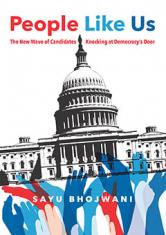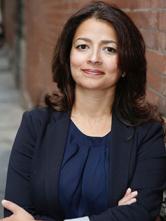AUTHOR SPOTLIGHT: Sayu Bhojwani
Over the past year, primary election results have revealed a progressive wave spreading acoss the country, with long-time incumbents being unseated by diverse new candidates. With the midterms upon us, we sat down with Sayu Bhojwani to discuss the present political moment and her new book, People Like Us: The New Wave of Candidates Knocking at Democracy’s Door. In stores now, People Like Us serves as an essential guide for the burgeoning democracy that has been a long time in the making: inclusive, multiracial, and unstoppable.
Sayu Bhojwani is the founder and president of New American Leaders, the only national organization focused on preparing immigrant leaders to run for public office. She served as New York City’s first commissioner of immigrant affairs from April 2002 to May 2004 and lives in New York. Learn more about Sayu and her book tour by clicking here.
We’re living through one of the most dysfunctional political eras in history. And yet at its core, People Like Us encourages more civic engagement, not less. What was the inspiration for this book, for telling this particular story, and for telling it now?
SAYU BHOJWANI: Through my work at New American Leaders, I was hearing incredible stories from candidates about what they were encountering on the campaign trail. Their stories demonstrated dedication and optimism in the face of institutionalized racism, and I began documenting them. After the 2016 elections, the conversation about our democracy didn’t reflect what I was hearing—that our democracy was broken long before Donald Trump got elected. I wanted to share what I knew—at a time when so many people are energized about participating in democracy—and to offer a road map for how we can build a more just system that works for all of us.
Why are the new Americans you write about so well-suited to hold public office?
SB: A telling story comes from Ilhan Omar, Minnesota state representative and the first Somali-American woman to win public office. Having lived under a dictatorship in Somalia, her grandfather was excited by the possibilities of democracy. She fondly remembers sitting at his side during political party caucuses and translating the proceedings into Somali for him. Immigrants take their civic duties seriously, especially those who come from countries where involvement in the political system is hazardous or impossible. Even if they are not eligible to vote, they belong to unions, correspond with elected officials, lead petition drives, and testify about the impact of local and national policy. Despite the national scapegoating of immigrants, these new Americans can be deeply committed to our democracy and are uniquely motivated to participate.
In People Like Us you write candidly of the costs, financial and otherwise, of public life. How do you see candidates and communities working to change the long-standing tradition of only the wealthy being able to choose public life and stay there?
SB: The perspectives of everyday Americans—people with the same working- and middle-class struggles as voters—are largely absent from policymaking because of the many costs of public life. For example, Arizona and Colorado have not adjusted legislators’ salaries since 1999, despite the fact that the cost of living has grown in the past twenty years. How can the voices of educators, social workers, or mothers, for example, be heard if they cannot support themselves on a legislator’s salary? Pay adjustments will allow legislators to focus on serving their districts and will help remove conflicts of interest from policymaking. Professionalizing salaries can prove unpopular with voters, but the importance of diversifying legislatures and removing outside money from politics can likely increase support for these necessary changes.
You write in the afterword, “Each year, more than half a million new Americans gain citizenship. No one is working to bring us into democracy.” How would you like to see civic engagement and activism made accessible to those who so often find themselves outside the traditional idea of “democracy,” such as undocumented people?
SB: Although many of us lack formal power, we have tremendous political power. DREAMers pushed the Obama administration and helped secure the protections of DACA. Community members who built the Black Lives Matter movement did so organically and created a powerful nationwide conversation. We need to acknowledge that we have power, and continue to organize, center ourselves in conversations about us, and run for office to shape the policy agenda for our communities. No one will vacate their seat at the table and offer it to us; we have to pull up a chair and make our own space at the table.
Have you seen any signs that state and local public offices are moving in the right direction toward a truly representative democracy? Are there any bright spots for removing the structural barriers?
SB: The 2018 election cycle has brought in a wave of diverse and dynamic political newcomers, many from marginalized communities. That’s a hopeful sign. Systemically, we’ve seen changes at the local level, for example in how districts are drawn. Several municipalities profiled in the book, from Yakima, Washington, to Anaheim, California, have changed from at-large to single-district elections—meaning that each city council member is elected by constituents from a specific district, rather than by a city-wide vote. This gives newcomers with limited resources a chance to enter politics at the ground level. Changing to single-district elections allows for representatives from more economically, politically, and ethnically diverse backgrounds.


